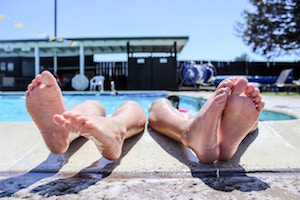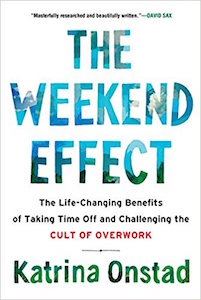How to Reclaim Your Weekend
A new book explains how we lost our work-life balance, why it matters, and what to do about it.
It’s funny how my weekends no longer feel like weekends of yore. Instead of spending time in play, exercise, or community pursuits, often as not I end up catching up on work, answering emails, or doing chores. Needless to say, this does not lead to a rejuvenated me come Monday morning.
But isn’t this simply the new reality of modern life? Shouldn’t I just get used to it?

The answer is a resounding no, according to journalist Katrina Onstad’s book The Weekend Effect. Onstad outlines how weekends came into being and how their purpose has eroded over time, as well as the many reasons why we shouldn’t let that trend continue. She makes a plea for leisure and meaningful pursuits outside our jobs, explaining how to disentangle ourselves from the cult of overwork so that we can live fuller, happier lives.
According to Onstad, too many of us continue to hold on to the myth that success means putting your nose to the grindstone 24/7—despite evidence to the contrary. She critiques the work/play culture of some companies, where employees are expected to participate in extensive social activities outside normal work hours, keeping them in constant work mode. And she warns against the cult of busyness—measuring your worth or success by how busy you are—which discourages people from taking time off. All of these modern trends conspire against workers but benefit employers—at least superficially.
At Amazon, for example, employees can “receive email onslaughts after midnight, and then text messages querying about the unanswered emails,” Onstad writes. This kind of work/life fusion breeds exhaustion, as well as a loss of energy and productivity around work. Still, there will always be those who thrive on pushing themselves to the limit.
“For every miserable worker, there’s another employee who thrives under the kill-or-be-killed conditions, and worships the samurai warrior methodology of the company’s founder, Jeff Bezos,” writes Onstad.
Besides the culture of overwork, overdependence on cell phones is another modern phenomenon that damages weekends. Despite our need for social contact (not to mention cognitive rest), our inability to disengage from technology—either due to work expectations or an addiction to its pleasures—keeps us away from face-to-face interactions with others. Onstad points to the work of Sherry Turkle, who argues that purposeful breaks from technology are needed to foster more social connection.
“Without face-to-face interaction, there’s a withering of that essentially human part of the self that rises only when confronted by a fellow being, flesh and blood,” she writes.
How to have a happy weekend
 The Weekend Effect: The Life-Changing Benefits of Taking Time Off and Challenging the Cult of Overwork (HarperCollins, 2017, 304 pages)
The Weekend Effect: The Life-Changing Benefits of Taking Time Off and Challenging the Cult of Overwork (HarperCollins, 2017, 304 pages)
According to Onstad, weekends first came into being when individuals pushed for reform by striking for them. Today, she writes, it may be naïve to expect people to embrace more leisure if they don’t feel public support for it. She suggests that government entities need to weigh in on work polices for societal reasons—the potential benefits weekend time provides to stronger family and community bonds. Some countries, like Sweden, offer extended personal time to their workers without the economy suffering, and she suggests America follow suit.
“When politicians blow the bullhorn about the erosion of the social fabric, they need to acknowledge that a society weakens when its members are no longer able, or willing, to come together outside work,” she writes. “Work-life balance isn’t simply something to be negotiated in the workplace; it’s a public-interest issue.”
What will we do if we’re not online or working? Onstad suggests that weekends can be a time to repose, reflect, engage, and consider larger questions about our lives. If we never take time out from our quotidian affairs, she argues, we won’t really savor the things that matter most in life. She suggests exposing ourselves to awe-inspiring vistas or art to help us transcend our current understanding and experience wonder, and to engage in volunteerism or other altruistic pursuits that can benefit our well-being and longevity.
While many of her recommendations are right out of Greater Good’s playbook, I particularly enjoyed reading about some of her quirkier ideas. For example, her suggestions to participate in ecstatic dance (for physical release and connection to others), attend tailgate parties (as a community-building activity and shared emotional experience), and even just go out to brunch (to rebel against rushing and to savor life’s pleasures) all made me reconsider my own pale-by-comparison weekend pursuits.
Onstad makes many other recommendations for how we can make the most of our weekend time, culminating with a “weekend manifesto,” which suggests incorporating connection, care, play, nature, beauty, and inactivity into our weekend rituals. In that way, we may find ourselves happier, healthier, and, ironically, re-energized around our work—perhaps so much so that we’ll want to incorporate more of these aspects of living into our workweek, too.
“Eventually, we may no longer be scrambling with futility to balance work and life, but living all the time, fully and well,” she writes.